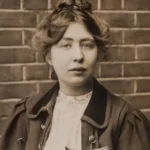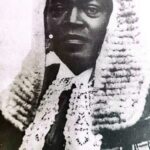FODAY, TARAWALY
- 3 Min Read
Foday Tarawaly (circa 1780s-1880s), chief of Gbile (Billeh), a town on the Great Scarcies River, opposite Kambia, in northern Sierra Leone, was an Islamic scholar, who founded centre of Koranic learning which flourished from the middle of the 19th century until 1875.
He was born in the Morea Soso country in the Northern Rivers region in what is now the Republic of Guinea. As a youth, he received his Islamic education in Morea, and his erudition won him a reputation as a respected scholar.
About the 1820s, he left Morea with his elder brother, Brima Kondito, and travelled towards Dixing in the Kambia district of northwestern Sierra Leone. There they became subject to the Soso Sankoh family, which controlled the Great Scarcies river ports north of Kambia. The Sankoh gave Brima Kondito the village (as it then was) of Gbile. As Brima Kondito wished to travel further south into Temne country, however, he left Foday Tarawaly to rule Gbile.
At Gbile, Foday Tarawaly founded a centre of Koranic learning which quickly grew in size. His erudition and piety earned him the designation of “High Priest of the Morea.” By the mid-19th century, the centre had become an institution which astonished observers. Edward Wilmot Blyden visited the institution in January 1872 and described Foday Tarawaly, the rector, and his activities in the following terms:
Opposite Kambia on the northern bank of the Great Scarcies is the Mohammedan town of Billeh whose presiding genius Fode Tarawally enjoys great literary celebrity. Billeh is a sort of university town devoted altogether to the cultivation of Mohammedan learning. On the 12th of January, I visited it and made a small present to the literary chieftain, I found him…reading a manuscript… He received me with an easy grace and dignity and had all the gravity and reserve of a teacher. Addressed me occasionally in Arabic. He not only seemed at home in the dogmas of his faith but he discussed instructively some of the most important subjects of human inquiry and quoted in support of his views, the opinions of leading Arabia writers. He spoke in high terms of Beidhwai and Jelaladdin as commentators on the Koran.
By this time, the centre had “several hundred young men ” as students, and also held classes for women. Three of Foday Tarawaly’s sons had graduated to become instructors in the university.
Disaster, however, struck the institution in 1875, when the Temne of Dixing drove Foday Tarawaly from Gbile and dispersed his students. In 1876, he was reported as having no centre of his own, although he was still considered significant enough to be included in a listing of chieftains in northern Sierra Leone. But Foday Tarawaly was by now about 90 years old, and must have died shortly thereafter.
C. MAGBAILY FYLE





